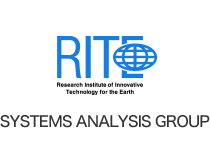Project for international cooperation on the analysis and assessment of technologies for climate change mitigation (ALPS IV; FY2022-)
ALPS Project(ALternative Pathways toward Sustainable development and climate stabilization)
Background and objective
As global warming is bound to have severe impacts on the whole planet, there are high expectations for solutions to this issue. However, while global warming affects various sectors in every country of the world, its impacts are not uniform. Mitigation measures and associated costs that countries can afford to take and pay may differ to very large extent. A comprehensive policy package is thus needed to allow truly effective climate mitigation implementation on a global scale.
The Paris Agreement that was adopted at the twenty-first session of the Conference of the Parties (COP21) in Paris at the end of 2015, came into force in November 2016. At COP26 held in Glasgow in November 2021, the rules related to the market mechanism regarding Article 6 of the Agreement, which had not been resolved, was agreed upon and the Paris rulebook was finally completed. The first Global Stocktake is scheduled for 2023, and has been reviewing global collective actions toward the Paris Agreement goal and assessing progress toward meeting the goal. More than 150 countries and regions around the world have pledged to be carbon neutral by the middle of the 21st century, and we are entering an era in which addressing global warming is seen as an opportunity for growth globally. In June 2019, the Japanese government developed a "long-term strategy as a growth strategy based on the Paris Agreement," in which it "aims to achieve net zero emissions as early as possible in the second half of the 21st century. In October 2020, Prime Minister Suga declared in his policy speech that he would" aim to achieve a carbon-neutral, decarbonized society by 2050. In December 2020, the Ministry of Economy, Trade and Industry (METI) took initiative in formulating the "Green Growth Strategy". Responding to this, the Japanese government strengthened its greenhouse gas emission reduction target for 2030 from a 26% reduction compared to the FY2013 level to a 46% reduction, and then possibly to a 50% reduction in April 2021. The 2030 target has been strengthened, especially in developed countries. In this way, the movement toward ambitious emission reductions is accelerated in Japan and abroad. In October 2021, the Cabinet approved the Sixth Strategic Energy Plan, as well as the Global Warming Prevention Plan and the Long-Term Strategy as a growth strategy based on the Paris Agreement. In 2022, the issue of energy security and stable supply emerged. The soaring fossil fuel prices due to the Russia-Ukraine war and the tight power supply-demand situation in March 2022 have once again made us aware of the issues of energy security and stable energy supply, and the Cabinet approved the "Basic Policy toward the Realization of GX (Green Transformation)" in February 2023.
Turning our eyes to the world again, we see COP26, did not result in the agreement that the UN and the UK government had expected and there was little progress to the NDCs' emission reduction targets by COP27, held in Sharm El Sheikh, Egypt in November 2022. Although the international community is generally aware of the need to strengthen climate actions, there is still a large gap in terms of specific measures among countries. In order to achieve carbon neutrality on a global scale, it is necessary to correct competitive unfairness caused by differences in ambitions and policy intensity among countries and to prevent carbon leakage in formulating international rules. In this context, the importance of comprehensively considering the situation of each country, region, and sector, as well as conducting various assessments and analyses that can contribute to the formulation of climate change policies, is increasing even more. The Intergovernmental Panel on Climate Change (IPCC) has released its Sixth Assessment Report as the latest scientific assessment of climate change. While building on this report, further scientific assessment of complex issues needs to be conducted. The process of preparing the Seventh Assessment Report is expected to start in the near future, and there is a continuing need to provide the latest scientific knowledge on climate change.
This project assesses mitigation and adaptation measures, climate finance and climate policy in a consistent and comprehensive manner, taking into account the latest scientific knowledge on the subject, recent trends in international negotiations, and cooperating with international research organizations to suppport the formulation of Japan's climate change policy and international discussions such as IPCC and COP. This will contribute to the formulation of a future framework and Japan's international strategy aiming for a "virtuous circle between the economy and the environment" that will bring about changes in the industrial structure and society and lead to economic growth.

